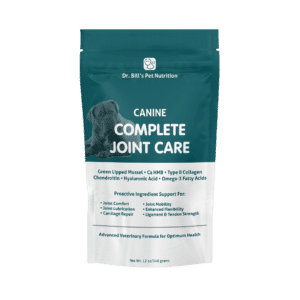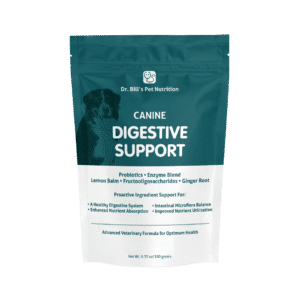Obesity is a growing concern for both humans and their pets, and dogs are no exception. According to the Association for Pet Obesity Prevention (APOP), nearly 60% of dogs in the United States are classified as overweight or obese. While the occasional extra treat or indulgence might seem harmless, carrying excess weight can have serious consequences for a dog’s health, longevity, and overall quality of life.
What is Canine Obesity?
Obesity in dogs is defined as an excess accumulation of body fat that impairs their health. Just like in humans, obesity in dogs is typically a result of an imbalance between the number of calories consumed and the number of calories burned. Contributing factors include overfeeding, poor-quality food, lack of exercise, genetics, and even certain medical conditions or medications. Obesity is often measured using a body condition score (BCS), a 9-point scale where a score of 5 represents an ideal body weight. A score of 6-7 indicates an overweight dog, and 8-9 represents obesity. Vets often assess this condition during routine check-ups, but pet owners also need to recognize the signs, such as difficulty feeling the ribs, a lack of waistline, or visible fat deposits.
Health Impacts of Canine Obesity
One of the most alarming consequences of obesity in dogs is its impact on lifespan. Studies have shown that overweight dogs tend to live shorter lives than their leaner counterparts. The Canine Health Information Center (CHIC) notes that obese dogs can have a reduced life expectancy by up to 2.5 years. Excess weight puts additional strain on a dog’s internal organs and systems, increasing the risk of chronic diseases that can shorten their lifespan. Dogs with obesity are more likely to suffer from joint issues like arthritis, heart disease, respiratory problems, and diabetes. These conditions not only make it harder for dogs to enjoy life, but they also increase the need for veterinary care and may necessitate expensive treatments, reducing the overall quality of life.
One of the most immediate and noticeable effects of obesity is on a dog’s joints. Excess weight places additional stress on a dog’s bones and cartilage, particularly in larger breeds. This leads to an increased risk of joint problems, including arthritis and hip dysplasia. These conditions can be painful and can severely limit a dog’s mobility. The inability to run, jump, or walk comfortably can drastically reduce a dog’s quality of life, leaving them less active and more sedentary. For dogs suffering from arthritis, excess weight can exacerbate the condition, causing more inflammation and pain. This creates a vicious cycle, the dog moves less because of pain, which leads to more weight gain, worsening the arthritis symptoms. This cycle can be difficult to break without intervention.
Obesity also puts strain on a dog’s internal organs. The heart, for example, must work harder to pump blood through a body that has more fat, increasing the risk of cardiovascular disease. In addition, the liver, kidneys, and pancreas are affected by the additional metabolic demands that come with obesity. This can lead to conditions like fatty liver disease, insulin resistance, and even diabetes. Obese dogs are also more likely to experience difficulty breathing. Excess fat, especially around the chest and abdomen, can limit lung expansion, leading to labored breathing and an increased risk of respiratory complications. This makes it harder for dogs to engage in physical activity and reduces their ability to enjoy life fully.
Improve Your Dog’s Nutritional Health with Dr. Bill’s Pet Nutrition
The good news is that obesity is preventable and manageable with the right approach. A combination of proper diet, portion control, and regular exercise can help your dog maintain a healthy weight and significantly improve their overall health. Regular vet check-ups can also help catch any weight-related health issues early, allowing for timely intervention.
Nearly all canines are known for their insatiable appetites, and the correct amount and type of food you should feed your dog depends primarily on their age, weight, and activity level. Originally formulated to help performance dogs reach their maximum potential, Canine Ultimate Fitness & Health is a delicious, concentrated nutritional powder, providing a balanced blend of 55-nutrients your Beagle needs for better health, increased activity, maximized performance, the prevention of age-related diseases, and ultimately a longer, healthier, and more enjoyable life.
-
Canine Ultimate Fitness & HealthPrice range: $37.99 through $69.99 — or subscribe and save 10%
-
Canine Complete Joint Care$79.99 — or subscribe and save 10%
-
Canine Digestive Support$31.99 — or subscribe and save 10%











0 Comments